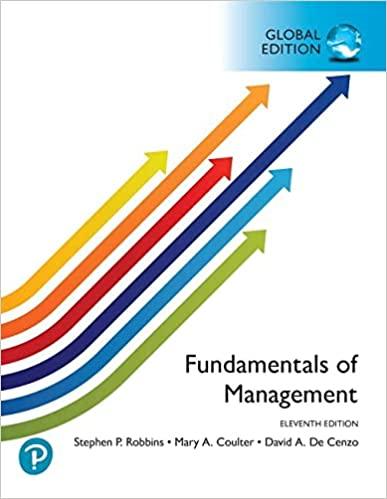Its estimated that the average corporate user sends and receives some 112 e-mails daily.78 Thats about 14
Question:
It’s estimated that the average corporate user sends and receives some 112 e-mails daily.78 That’s about 14 e-mails per hour, and even if half of those don’t require a lot of time and concentration, that level of e-mail volume can be stressful and lead to unproductive time. Once imagined to be a time-saver, has the inbox become a burden? What about voice mails?
Are phone messages even necessary for organizational communication? These and other concerns are forcing many organizations to take a closer look at how information is communicated.
Several years ago, U.S. Cellular’s executive vice president implemented a ban on e-mail every Friday. In his memo announcing the change to employees, he told them to get out and meet the people they work with rather than sending an e-mail. That directive went over with a thud. One employee confronted him saying that Ellison didn’t understand how much work had to get done and how much easier it was when using e-mail. Eventually, however,
employees were won over. Forced to use the phone, one employee learned that a coworker he thought was across the country was, instead, across the hall. Now, other executives are discovering the benefits of banning e-mail.
Tom Gimbel, founder and CEO of LaSalle Network, instituted a “no e-mail day” once a quarter. By cutting back on some of the issues associated with email communications, he’s found that his employees have gotten better at “live” communication,
face-to-face conversations, and collaboration. Jessica Rovello, cofounder and president of Arkadium, which develops games, has described e-mail as “a form of business attentiondeficit disorder.” She found herself—and her employees—
putting e-mail in the inbox ahead of everything else being worked on. What she decided to do was only check her e-mail four times a day and to turn off her e-mail notification. Another executive, Tim Fry of Weber Shandwick, a global public relations firm, spent a year preparing to “wean” his employees off their e-mail system. His goal: dramatically reduce how much e-mail employees send and receive. His approach started with the firm’s interoffice communication system, which became an internal social network, with elements of Facebook, work group collaboration software, and an employee bulletin board.
And then there’s Thierry Breton, head of Europe’s largest IT firm, Atos. He announced a “zero e-mail policy” to be replaced with a service more like Facebook and Twitter combined.
The latest casualty in organizational communication choices is voice mail. Under pressure to cut costs, several large financial institutions, including J.P. Morgan Chase &
Co., Citigroup Inc., and Bank of America Corp., are deleting or cutting back on phone voice mail. Some company executives explaining their actions cite the reality that few people use voice mail anymore. The question remains, however, whether customers still expect to be able to maintain voice contact with their financial advisors.
Discussion Questions
1. What do you think of this? Do you agree that e-mail and voice mail can be unproductive in the workplace?
2. Were you surprised at the volume of e-mail an average employee receives daily? What are the challenges of dealing with this volume of e-mail? How much e-mail would you say you receive daily? Has your volume of e-mail increased? Have you had to change your e-mail habits?
3. What do you think of the e-mail “replacement” some businesses are using—more of a social media tool? In what ways might it be better? Worse?
4. What role should customer service play in choosing which organizational communication methods to use?
5. Write a memo that you would send to your employees telling them that you’re declaring a no e-mail day once a month. In that memo, be sure to explain why you’re doing it and what benefits you hope your employees will experience.
Step by Step Answer:

Fundamentals Of Management
ISBN: 9781292307329
11th Global Edition
Authors: Stephen P. Robbins, Mary A. Coulter, David A. De Cenzo





